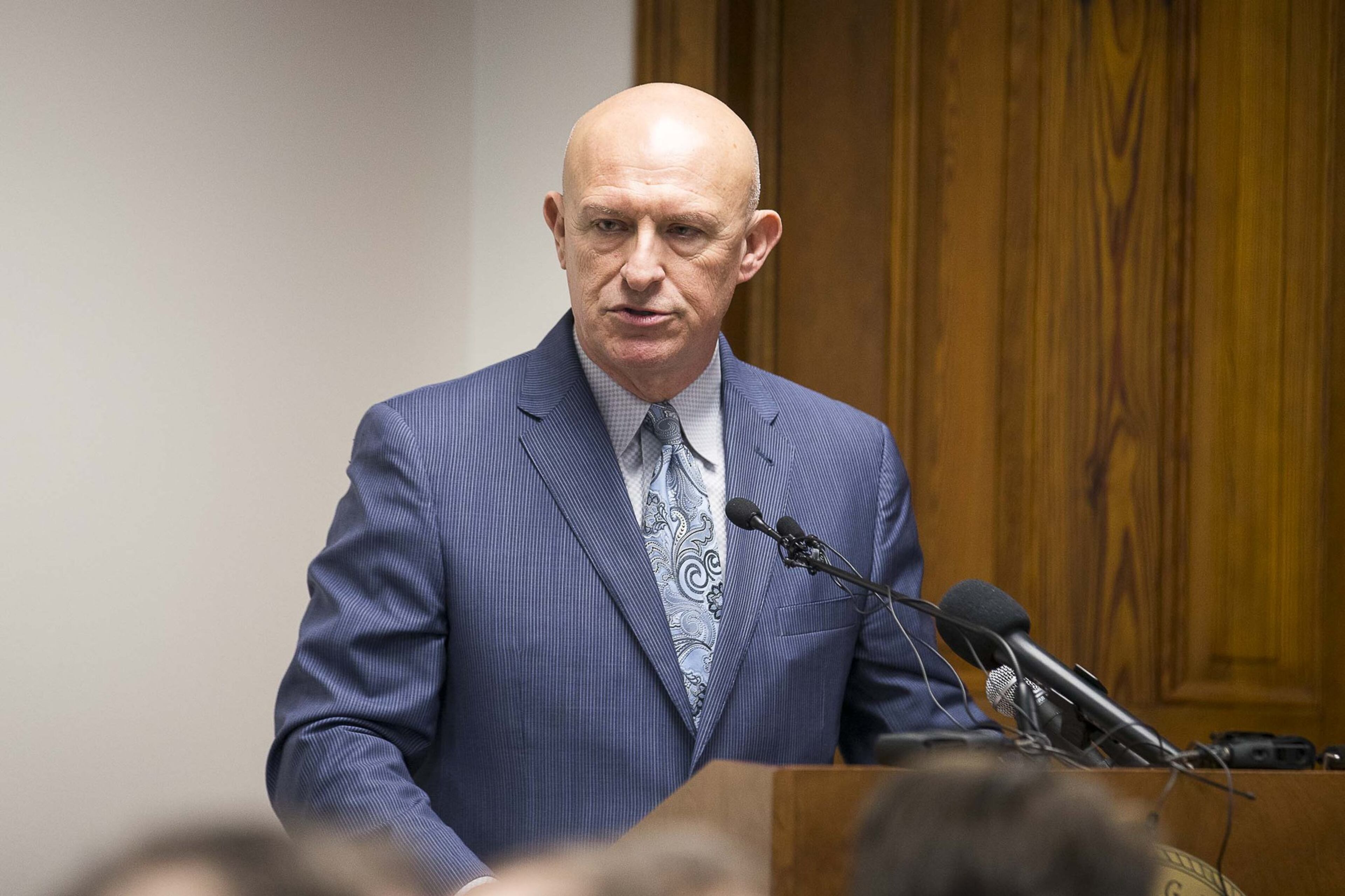Key information missing from Georgia’s criminal records database

Georgia’s database of criminal histories is filled with information gaps that make the records unreliable for the state’s judges, employers and probation officers.
In Fulton County alone, the criminal records system has no final outcomes recorded for more than 1.5 million charges, about 40% of all the Fulton charges in the database, The Atlanta Journal-Constitution has found. About 19,000 charges with missing information are for serious violent felonies.
The vast majority of the charges without dispositions entered have dragged on for so long without updates that potential employers and licensing agencies cannot even see the serious charges when they check a job candidate’s record. Prosecutors can’t be sure they’re seeing someone’s complete record when they check the database to see if they are dealing with a repeat offender. Judges say that missing information means they can’t be confident when imposing a sentence or setting a bond for pre-trial release.
“When we look at an offender’s criminal history and there isn’t one, that may or may not be true,” Fulton County Superior Court Chief Judge Christopher S. Brasher said when testifying before a state legislative committee in October. “We need better information so we can make better decisions.”
The system needs to be improved in order to help protect the public, judges and prosecutors say. Yet even as lawmakers look for ways to enhance safety in the midst of a surge in violent crime, improving the reliability of the database doesn’t seem to be a priority. The gaps have persisted for years.
Criminal histories are warehoused by the Georgia Bureau of Investigation’s Georgia Crime Information Center (GCIC), but law enforcement and courts across the state feed all the information into the system that GBI maintains.
For more than 1 in 4 charges statewide — covering nearly 7 million entries in the system — no disposition has been entered. For 5.4 million of those charges, the cases have been languishing for years without updates and don’t appear in checks by employers, according to Georgia Bureau of Investigation records.
In some cases, arrests resulted in convictions, but clerks never entered the outcome in the state system. Other charges were dropped or changed through plea deals or were never prosecuted. But those outcomes on the original arrest weren’t sent in, either.
Special report: Georgia’s public safety system
“It’s a problem that needs to be addressed,” said Pete Skandalakis, executive director of the Prosecuting Attorneys’ Council of Georgia.
The gaps in criminal histories exist in almost every jurisdiction, although records from some Georgia counties are far worse than others.
In 17 Georgia counties, fewer than 60% of charges have dispositions filed, according to GBI report cards for each county in the state.
In rural Johnson County, only a third of charges listed in the system have dispositions, the lowest statewide, the GBI records show.
Meanwhile, some counties do a much better job of recording dispositions. Wilkinson County has reported outcomes in 93% of the charges. Fayette County, a large jurisdiction in metro Atlanta, has entered dispositions for 87% of its charges, and Rockdale County is nearly as comprehensive with 86% of charges accounted for.

Who dropped the ball?
Responsibility for the gaps extends to many in the criminal justice system.
Dispositions for cases coming out of Fulton County Superior Court are entered in GCIC within 48 hours of a case being completed, said Cathelene “Tina” Robinson, the Fulton County Superior Court Clerk.
But clerks aren’t given information on all the charges police may have entered in a case, said Robinson, who is also president of the Council of Superior Court Clerks of Georgia.
Because prosecutors may, at times, change charges as they work on cases, there may be a mismatch between the charges in an indictment and the charges police send to GCIC.
Robinson said she isn’t aware of a clear process in the state to deal with charges in the system that aren’t pursued by prosecutors. That can often leave charges in GCIC without a final disposition, she said. Robinson said she is working with Fulton’s new District Attorney, Fani Willis, to try to address the issue, and Willis said she has made fixing the issue a priority.
“When I took office as District Attorney last year, it became obvious to me and my team that there is a serious problem with final dispositions of arrests and charges being properly recorded in GCIC,” Willis said. “I have spoken to the Fulton County Commission, the sheriff, the solicitor, the Superior Court clerk, local police departments, the General Assembly, the Atlanta Police Foundation and the Metro Atlanta Chamber of Commerce about the scope of the problem and the serious consequences that result from it.”
Willis said the business community “stepped up” through the Metro Chamber to engage expert help from the consulting firm Accenture to “fix the problem with old records that need to be properly recorded and improve the process going forward so that this problem does not continue moving forward.”
GBI Director Vic Reynolds said that getting accurate and timely dispositions to GCIC is an important key to public safety.
“Decisions made by stakeholders, such as judges, prosecutors, and potential employers, are best done when they are fully and accurately informed about an individual’s criminal history,” he said. “This also protects individual citizens when their histories are kept up to date and timely.”
In addition, timely updates are important to licensing agencies and employers running background checks. Their access to the records is restricted if too much time passes before a disposition is entered.
For misdemeanors, the time limit is two years; for many felonies, it is four years; for serious violent felonies, it is seven years.

What’s more, if information about a charge is incomplete or inaccurate, it can upend someone’s life. The Georgia Justice Project said it represented a woman blocked from rental housing because her record listed a felony drug conviction from Atlanta Municipal Court. Since the municipal court doesn’t have jurisdiction to resolve felony cases, this could not have been right. In fact, the case was resolved as a local ordinance violation, GJP said, which is not considered a criminal conviction. GJP had to get involved to help her correct it.
Years ago, GJP helped another man who was blocked from working as a mortician because a misdemeanor conviction was incorrectly entered as a felony conviction. It took months to clear up.
Systems won’t talk
The database suffers from other issues, too, the AJC found. The Department of Community Supervision, which handles probation and parole, can’t easily connect its database to the GCIC data.
While probation officers can look up individual records of those they supervise, and they do so daily, the agency doesn’t have a way to download data to capture arrest information for all probationers.
So while the agency knows that its supervisees were arrested on 212,014 felonies over the past three fiscal years, including 61,152 in fiscal 2021, it can’t provide detailed breakdowns of the types of felonies for each year.

For an agency that prides itself on being data-driven, the barriers to obtaining comprehensive data make it difficult to analyze its own work.
“We’re a learning organization,” said DCS Commissioner Michael Nail. “We learn from our mistakes. We use data, statistics and research to get better.”
DCS said it is working on a project to make the GCIC and DCS data systems compatible. The agency is also involved in a national initiative to improve criminal justice metrics across agencies and states.
Skandalakis, of the Prosecuting Attorneys’ Council of Georgia, said everyone involved in the criminal justice system needs to come together to make sure the dispositions are entered so that all the players in the system have the information they need.
GBI could also play a role, he said, by offering a more user-friendly interface.
“Everybody bears some responsibility,” he said.
But he emphasized that after years of problems, it was time to deal with the issue.
“It’s vital,” he said.




